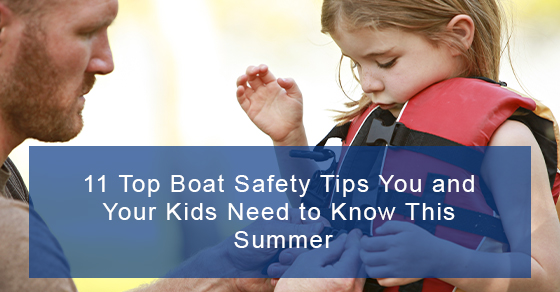
11 Top Boat Safety Tips You and Your Kids Need to Know This Summer
Posted by on Jun 07, 2021 in
Boating is a wonderful Canadian pastime. It allows you to get out on the water, explore the lakes and rivers, water ski, fish and more. However, as fun as it can be, it can quickly turn to tragedy if you don’t follow safety tips and laws. It just takes one wrong move to lead to a boating accident. Here we review the 11 top boat safety tips you need to know to keep you and your kids safe this summer.
1. Only operate power-driven boats with a licence
Although it might seem fun to let a friend or family member occasionally take the helm of your boat, a Pleasure Craft Operating Card (PCOC) is necessary to operate a powered watercraft in Canada. Anyone caught manning a boat without a PCOC could be fined. Be sure that anyone operating the boat has passed their boating safety test and has their PCOC handy while driving.2. Opt for the Boating Safety Course
This course isn’t mandatory, but it just makes good sense to learn how to be safe when boating. It doesn’t take up too much time and it also helps you prepare for your licence. It’s a win-win. You will learn how to reduce risks when boating and also become a more confident boater. Your new skills can be shared with your kids, so you set a good example about the importance of water safety.3. Follow weather reports
You know all too well that weather conditions can change in a heartbeat. Before you head out, make sure you check and follow your area weather forecasts. Keeping a marine radio on board so you can listen to the weather updates is a good idea. There are actually marine forecasts available in most areas on the water, so checking in on these channels makes sense. More importantly, make sure you understand the terms used such as “swells”, so you get a better handle on the dangers presented with the forecast. While out on the water, be sure to look for signs of changes such as the wind picking up, darkening skies or large, darker cloud banks on the horizon. A drop in temperature is also an indication of potential violent thunderstorms that can become dangerous. Always keep ahead of bad weather and head to shore at the first hint of a change for the worse.4. Be prepared
Especially for your first trip of the season, be sure you are prepared. Begin by having your boat inspected to make sure everything is in operating condition. Do a complete check including fuel and coolant levels as well as your lights, and instruments. Don’t forget the battery! You also want to be prepared for possible breakdowns, so stock the boat with water and essentials and include the following:- Enough personal flotation devices for everyone
- Food and water
- Distress signals
- Tools and spare parts
- Fire extinguishers
- First aid kit
- Marine radio
- Flashlight and batteries
- Rules and documentation such as charts and operating manual
5. Pack navigational charts (and know how to read them)
Navigational charts are very important if you are heading into an area you aren’t familiar with. They not only make navigation safer but are also required by law. The charts help you understand what lies below, such as water depths and formations that could cause an issue if you run into them. Consider taking a course to have a better understanding of navigational charts or research them online.6. Leave the alcohol at the dock
A good rule of thumb when boating is water on the water and beer at the pier. In other words, when you are out boating, choose non-alcoholic drinks and save enjoying a beer or glass of wine for when you are done boating for the day. Close to 65% of boating-related deaths are related to alcohol consumption, so why tempt fate? Add the heat of the sun and constant motion of the boat to being a little tipsy and the effects are amplified. If this isn’t enough of an incentive to avoid alcohol, remember drinking and boating is against the law and comes with some very unpleasant consequences.7. Use common sense
Always remember the water is there for everyone to enjoy. Your reckless behaviour could not only ruin other people’s enjoyment of the water and docks but also put you and others at risk. Apart from not drinking and boating, make sure to always practise the safe operation of your boat. Don’t try to deliberately spray other boaters or people on docks as you pass them, and never jump the wake created by other boats. Operate with caution in crowded areas and slow down if you experience low visibility. What might seem fun to you could lead to tragic circumstances you literally leave in your wake, without even realizing it.8. Share your plans
Never head out on the water without informing someone on shore you are going for a boat ride. Even simple little spins around the lake should be shared with someone staying behind, your marina staff or if you are alone at the cottage, a family member or friend. If you don’t do this, no one will know you are in danger and a search won’t be planned if things should go wrong. This includes trips with others. Provide your boat details, how many people are joining you and their names, as well as contact information for everyone. If you veer off from your planned destination, try to get that info to someone on shore as well as an estimate of how much longer you might be out on the water.9. Become a strong swimmer
If boating is part of your life, swimming is a must. Although you have to wear a lifejacket, falling overboard can be scary and frankly, most people don’t necessarily wear their life jackets on boating trips. Being a strong swimmer and making sure your family members can swim is the best way to avoid tragedy.10. Learn proper boating emergency procedures
Accidents can happen in a second. Being prepared with a clear understanding of how to react during a boating emergency can save lives. Be sure you know how to manage the following:- Sending distress calls using a marine radio including who you should call
- Recovering someone who falls overboard
- Survival tips for being stranded in cold water
- Boating fire prevention and how to put out a fire

